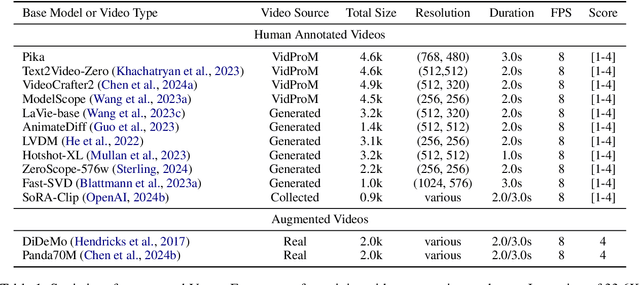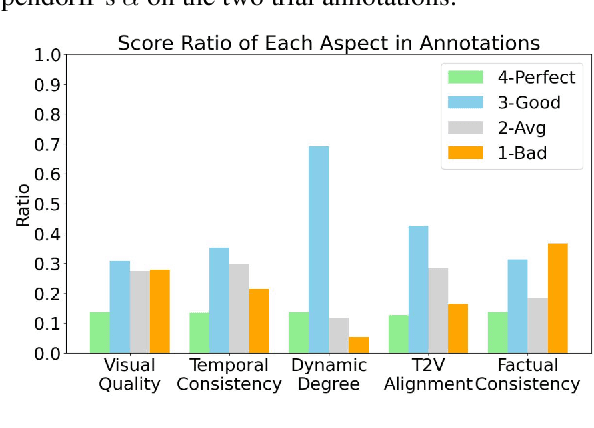Aaran Arulraj
VideoScore: Building Automatic Metrics to Simulate Fine-grained Human Feedback for Video Generation
Jun 24, 2024



Abstract:The recent years have witnessed great advances in video generation. However, the development of automatic video metrics is lagging significantly behind. None of the existing metric is able to provide reliable scores over generated videos. The main barrier is the lack of large-scale human-annotated dataset. In this paper, we release VideoFeedback, the first large-scale dataset containing human-provided multi-aspect score over 37.6K synthesized videos from 11 existing video generative models. We train VideoScore (initialized from Mantis) based on VideoFeedback to enable automatic video quality assessment. Experiments show that the Spearman correlation between VideoScore and humans can reach 77.1 on VideoFeedback-test, beating the prior best metrics by about 50 points. Further result on other held-out EvalCrafter, GenAI-Bench, and VBench show that VideoScore has consistently much higher correlation with human judges than other metrics. Due to these results, we believe VideoScore can serve as a great proxy for human raters to (1) rate different video models to track progress (2) simulate fine-grained human feedback in Reinforcement Learning with Human Feedback (RLHF) to improve current video generation models.
MMLU-Pro: A More Robust and Challenging Multi-Task Language Understanding Benchmark
Jun 04, 2024



Abstract:In the age of large-scale language models, benchmarks like the Massive Multitask Language Understanding (MMLU) have been pivotal in pushing the boundaries of what AI can achieve in language comprehension and reasoning across diverse domains. However, as models continue to improve, their performance on these benchmarks has begun to plateau, making it increasingly difficult to discern differences in model capabilities. This paper introduces MMLU-Pro, an enhanced dataset designed to extend the mostly knowledge-driven MMLU benchmark by integrating more challenging, reasoning-focused questions and expanding the choice set from four to ten options. Additionally, MMLU-Pro eliminates the trivial and noisy questions in MMLU. Our experimental results show that MMLU-Pro not only raises the challenge, causing a significant drop in accuracy by 16% to 33% compared to MMLU but also demonstrates greater stability under varying prompts. With 24 different prompt styles tested, the sensitivity of model scores to prompt variations decreased from 4-5% in MMLU to just 2% in MMLU-Pro. Additionally, we found that models utilizing Chain of Thought (CoT) reasoning achieved better performance on MMLU-Pro compared to direct answering, which is in stark contrast to the findings on the original MMLU, indicating that MMLU-Pro includes more complex reasoning questions. Our assessments confirm that MMLU-Pro is a more discriminative benchmark to better track progress in the field.
 Add to Chrome
Add to Chrome Add to Firefox
Add to Firefox Add to Edge
Add to Edge